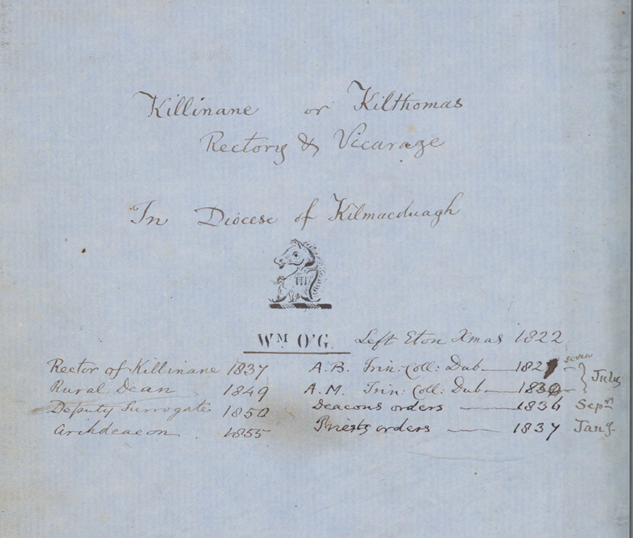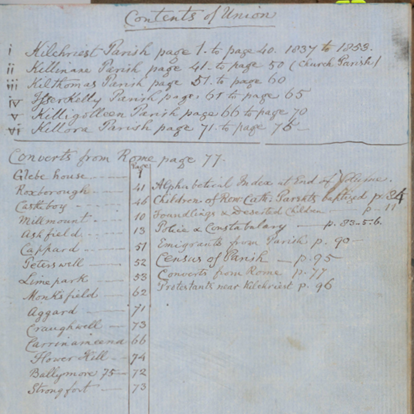An Unusual Local History Source: The Register of the Hon & Revd William O’Grady (1806-1859)
A rare and unusual source bringing to life a wealth of local and social history in Co. Galway has been revealed by the RCB Library. Rector’s registers, where individual members of the clergy would make notes and write up their observations on aspects of parish life, reveal a particular forensic attention to detail but were not often created or maintained, simply because they took time and effort to keep up-to-date. This was not the case in the united parishes of Killinane and Kilthomas, in the western diocese of Kilmacduagh, where the rector between 1837 and 1859 was the Hon & Revd William O’Grady (1806-1859).
clerThe title page of the volume bears O’Grady’s arms and initials, with biographical detail about his education and clFerical career, so it is clearly his creation, but the volume was significant enough that several of his successors continued to add to it, if in less detail, right up to 1926.

The register only recently came to light in private custody, and in a happy outcome was acquired by the RCB Library, where it is now integrated into the parish collection for Killinane and accessioned as RCB Library P.0959.28 and described thus: “Rector’s register commenced by the Hon and Revd William O’Grady (1806-1859), rector of Killinane 1837-59, containing his extensive notes and observations on parishioners in the union of Killinane and Kilthomas, covering the various parishes of Kilchriest, Killinane, Kilthomas, Isserkelly, Killigolleen and Killora parishes and individual townlands within. Includes details subsequently lost in the original parish registers such as baptismal, confirmation, marriage and burial dates, and much more besides, such as ‘Children of Rom. Cath. Parents Baptised’, ‘Police and Constabulary’ and ‘Converts from Rome’, as well as later draft visitation returns and parish census information for the 1860s and as recent as 1926, presumably completed by his successors, 1859-1926.”
O’Grady was born in 1806, the fourth son of Standish O’Grady, 1st Viscount Guillamore of Cahirguillamore, Co. Limerick, Lord Chief Baron of the Exchequer for Ireland, and his wife, Katherine Waller, second daughter of John Thomas Waller, Esq., of Castletown, Co. Limerick. He was educated at Eton before entering Trinity College Dublin on 1st December 1823, where he graduated with a BA in 1827, and MA in 1830. Ordained in Cork on 11th September 1836, the parish of Killinane and Kilchreest would be his first and only incumbency.
While he came from a privileged background, Mr O’Grady was known to be a humble man who took particular interest in the welfare of his parishioners, as evidenced by the entries in his Rector’s register, and a number of testimonials published following his death, such as that reported in the King’s County Chronicle of 27th July 1859, which commented: “He seldom left his parish, and since his appointment had expended all his time and the greater portion of his income on the education and spirtual welfare of his parishioners, by whom he was greatly loved and respected. It will not be an easy task for his successor to walk in the ways and to emulate the bright example of this excellent Christian.”
Just after his appointment to Killinane, O’Grady opened his personal register in 1837 (prior to the Great Famine period) and continued it until his death in 1859 thus spanning the period of the impact of the Famine and its aftermath. He was clearly struck by the poverty and difficult conditions, observing the state of various townlands and the situation for various parishioner households during the Famine period, and subsequently, being diligent and outspoken in seeking relief for the local population. In his role as secretary to the Kilchreest Famine Relief Committee, from July 1846, O’Grady was tireless in appealing to the Relief authorities for support to all members of the community, Protestant and Catholic.
The volume captures details of the parishioners of the six parishes of Killinane union (Iserkelly, Kilchreest, Killinane, Killogilleen, Killora, and Kilthomas), complete with helpful notations, which sometimes refer to the conduct or character of individual parishioners. It also includes population information lost from national census material, as well as information on hot topics such as foundlings and deserted children, local policing, converts from Rome, and emigration. It thus provides a rare window into the religious and social history of the parishes of Killinane union and is also a valuable source of family history, and will be of particular interest to the descendants of all those who resided in the former civil parishes of Killinane union (and Kilconickny union after 1906), regardless of their religious background.
The online presentation which includes a link to the digitized volume and highlights specific aspects of its content is the work of Gerry Kearney, a local historian who has produced several local and family history books, the most recent of which traces the history of the Taylor families of Kilchreest, Co. Galway, including data from the volume.
Mr Kearney comments: “As a beneficiary of the work of the Revd William O’Grady and his successors, I was honoured to be asked to provide this overview of the scope and content of the Killinane volume, which I can recommend as a very important source of family and religious history. Most importantly, the digitization of this very unusual and important source now allows the RCB Library to share it with a worldwide audience.”
